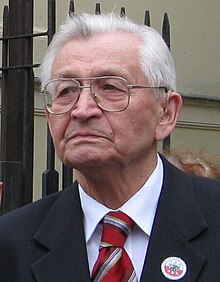Leszek Moczulski
Robert Leszek Moczulski [ˈrɔbɜrt ˈlɛʃɛk mɔˈt͡ʃulskʲi] (born June 7, 1930 in Warsaw ) is a Polish historian , journalist and lawyer as well as a former dissident and politician. He was the founder and long-time chairman of the nationalist party Confederation of Independent Poland (KPN).
Life
Moczulski joined the Communist Polish Workers 'Party (PPR) in 1948 as a law student at Warsaw University , which was merged with the PPS to form the Polish United Workers' Party (PZPR) at the end of the year . In 1950 Moczulski was excluded from the PZPR. In 1952 he completed his law degree. However, he renounced the career of a lawyer and worked as a journalist and publicist and began studying history at Warsaw University, which he completed in 1958.
In 1957 Moczulski was temporarily arrested and charged with criticizing the government, but acquitted in 1958, but still banned from practicing his profession. As a result, he was only allowed to publish under a pseudonym for a few years. Between 1969 and 1977 Moczulski worked as an undercover agent of the secret police Służba Bezpieczeństwa (SB) registered but Moczulski denies the active cooperation.
Leszek Moczulski got in touch with some contemporary witnesses of the Sanacja living in Poland (in particular Roman Abraham ) and wrote about the latest history. In particular, he drew attention to himself in 1972 with the book Wojna polska 1939 (German: Polish War 1939) , in which he unveiled the German and especially the Soviet attack on Poland in September 1939 . Since the book was only recalled by the Office for Censorship after its publication , it was able to spread quickly and achieved cult status among critics of the regime. In 1977, Moczulski was one of the founders of the Movement for Defense of Human and Civil Rights (ROPCiO) alongside Andrzej Czuma , Aleksander Hall and Marian Piłka .
On September 1, 1979, Moczulski founded the KPN . It was the first regime-independent party to be founded in Poland in over 30 years. After several short-term arrests, he was arrested in September 1980. In the trial that began in June 1981 in which Tadeusz Jandziszak, Tadeusz Stański and Romuald Szeremietiew were also accused ("First KPN Trial"), he was sentenced to seven years' imprisonment in October 1982 for preparing for a coup. After an amnesty , he was released in August 1984.

After attempting to rebuild the party, Moczulski was arrested again in March 1985. Again against him and Krzysztof Król , Andrzej Szomański , Adam Słomka and Dariusz Wójcik a trial ("Second KPN Trial") ended in a guilty verdict and four years imprisonment for Moczulski. Amnestied again in September 1986, Moczulski went into exile in France , Great Britain and the USA .
In the semi-free parliamentary elections in 1989 , the reorganized KPN did not join the “ Solidarność ” election committee and rejected the agreements with the government. The party leader Moczulski applied for a seat in the Sejm in Krakow , but lost to the candidate of “Solidarity” Jan Maria Rokita . In the 1990 presidential election he stood up for his party and came last among the six candidates with 2.5%. In 1991 he was elected to the Sejm. He was able to keep his parliamentary seat after the early election from 1993 to 1997. Also in 1995 he applied for the presidency , but waived before the vote in favor of the incumbent Lech Wałęsa . On June 4, 1992, Moczulski's name appeared on the list of former V-people of the SB published by Interior Minister Antoni Macierewicz . When the KPN split into two competing factions in 1996, Moczulski retained the chairmanship of one of the factions until it was deleted from the party register in 2003.
Due to the so-called lustration law introduced in Poland , all official and mandate applicants were obliged to submit an affidavit about their possible cooperation with the former intelligence organizations of the VR Poland . Moczulski said he did not work with the intelligence services. This declaration survived judicial review on November 1, 2001, but was rejected in the second instance on July 23, 2002 for re-examination. With the decision of April 6, 2006, which became legally binding on September 2, 2006, the court found that Moczulski had lied. His application for cassation proceedings was ruled negative in 2008. Moczulski alleged that he was not given access to evidence due to secrecy, sued the ECJ because of the unfair trial and was right in 2011. After the retrial before the Supreme Court , Moczulski withdrew his application on May 18, 2018 after 47 days of trial.
In 2005 Moczulski received his doctorate (his doctoral supervisor was Bronisław Geremek ) and in 2009 he completed his habilitation. After the unsuccessful parliamentary election in 1997 , he renounced active political work and devoted himself to the historical analysis of post-war Poland.
Individual evidence
- ↑ Piotr Dabrowski: Komunikat Oddziałowego Biura Lustracyjnego w Warszawie dotyczący postępowania autolustracyjnego Roberta Leszka Moczulskiego. In: Instytut Pamięci Narodowej , August 1, 2018; accessed on October 14, 2019 (Polish).
Web links
- Jan Kowalski: Leszek Moczulski, born 1930 . In: dissident.eu; accessed on October 13, 2019.
- Encyclopedia PWN : Moczulski Leszek . Retrieved October 13, 2019 (Polish).
- The Soviets should withdraw. (interview with Leszek Moczulski) . In: Der Spiegel , August 15, 1980; accessed on October 13, 2019.
| personal data | |
|---|---|
| SURNAME | Moczulski, Leszek |
| ALTERNATIVE NAMES | Moczulski, Robert Leszek (full name) |
| BRIEF DESCRIPTION | Polish historian and politician |
| DATE OF BIRTH | June 7, 1930 |
| PLACE OF BIRTH | Warsaw |

